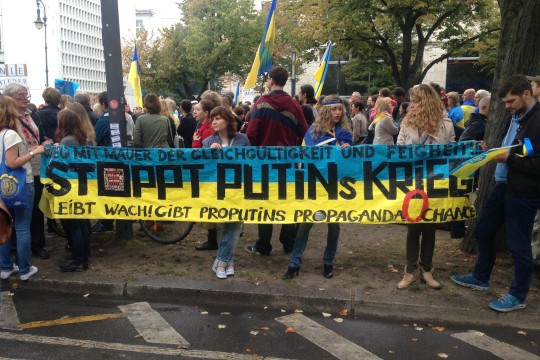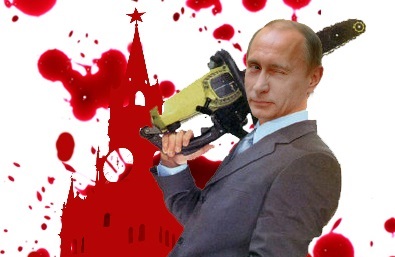The “dark wasteland of the Russian soul” and its manic desire to conquer world have deep roots. You can verify this by reading the book of the French Marquis de Custine "Russia 1839".
"This huge empire that suddenly appears in front of me to the east of Europe, that Europe, where society suffers in poverty of each recognized authority - this empire makes an impression on me of a revolt of the dead. I think that I am among the nations of the Old Testament, and I pause in horror mixed with curiosity, before a laboratory of antediluvian monsters,"
wrote the French nobleman in a letter from Russia in 1839. He was prompted to go there by the frustrated proto-democratic republican France, he believed that the absolute power of the empire was better than chatter and democratic debate. So he went with the hope of magic and returned from the Russian Empire with these words:
"Anyone who gets closely acquainted with tsarist Russia will be happy to live in any other country. It is always good to know that there is a state in the world in which happiness is impossible."
This book (curious readers can find it in different languages on the Internet; in English here
) does not lose relevance today. Finally, it should be recognized that each generation opens it for itself, right after its publication it became a bestseller in France, and the Russian censorship just as promptly banned it (notably the Russian government then began a campaign to discredit the Marquis of Custine in Europe, for money, [paid] and through a network of agent’s promotional materials published in the leading European media - all that just like now, right?). Later Herzen [Aleksandr Herzen was a Russian writer and thinker known as the "father of Russian socialism" and one of the main fathers of agrarian populism - translator] wrote of "Russia in 1839": "Without a doubt, this is the most interesting and brightest book written by a stranger on Russia."
It was especially relevant to the Ukrainian soul which in its own skin knew the "beauty" of life under the Russian boot. After World War II Dontsov [father of Ukrainian nationalist ideology from Melitopol, south-eastern Ukraine - translator] addressed comments from the Marquis of Custine book in which he often emphasized that the USSR under Stalin and Khrushchev were different from that Imperial Russia described by the Frenchman in name only. After all, it was Custine himself who captured this main characteristic of Russia:
"The Russians have only names, but there is nothing in reality - a country of facades.”
The “Potemkin-ite” essence of the Moscow empire, which was cleverly illustrated for the strangers eyes, was captured by the French traveller in just three months of travel.
Today it is the turn of our generation to open the striking relevance of the Marquis of Custine’s observations. It appears that nothing has changed, so this book can and should be given Ukrainian officials, MPs, military and foreign politicians, Western negotiators and the "useful idiots" of Putin’s regime in the West. Is it not it worth it to read the current opinion, written 175 years ago:
"All I can tell you, is that from the time I was in Russia, I see a black future of Europe. (...) Why is Russia so dependent on feeling itself a severe threat to Europe? To influence European policy? (...) Russia sees in Europe prey that through our [Europe’s - translator] divisions, sooner or later, will be given to the wolves. "
Following Herzen and Dontsov, I must admit that I have not read a book better and wiser about Russia in which would be so subtly captured the essence of the criminal and brutal Russian soul. Every subsequent generation, opens "Russia in 1839" by the Marquis of Custine for themselves - and can be horrified by the relevance of these travel notes. This book helps eliminate unnecessary illusions and dispels the smokescreen put out on European eyes by the Kremlin propaganda machine - and leads to the conclusion that with a deceitful Russia it makes no sense to agree about anything, you can only win against it and force it to respect our rights.
And finally the Marquis de Custine:
"At the heart of the Moscow people there is disorderly ambition; this ambition knows no bounds, it can only poison a depressed soul, and it is powered by the misfortune of an entire nation. This nation is essentially aggressive and bent due to poverty; in its lowly roots it cherishes a hope to extend tyranny and dominance over others; [the acquisition of] fame and wealth that it hopes will divert its mind from the shame in which it exists, and to wash off its wicked donation (forfeit) of social and personal freedom, the slave on its knees dreams of world domination."
An observation of Russia from 1839! And nothing to add.
[hr]Author: Andrew Ljubka is a Ukrainian poet, novelist and essayist. Author of three collections of short stories and poems, winner of literary awards "Debut" and "Kyiv Monastery". His works have been translated into more than ten languages, some books published in Austria and Poland. He lives in Kyiv.
Translator: Stepan Pasicznyk is the press / information officer for National Executive of Ukrainian Youth Association in G.B. and session musician / songwriter/ translator of Ukrainian songs to English at www.ukrainians.org.uk





